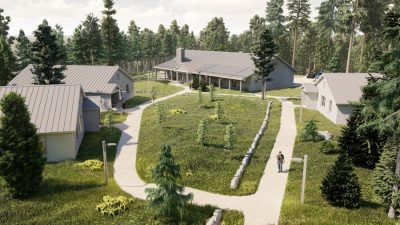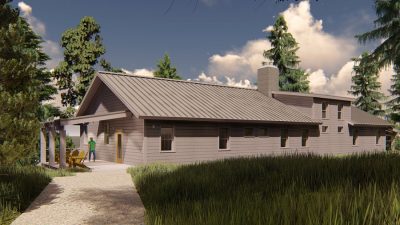HARPSWELL — Construction is underway on a multimillion dollar expansion of Bowdoin’s Schiller Coastal Studies Center that the college says will change the way it teaches students and involves coastal communities in conversations about a rapidly changing ocean.
The 118-acre center in Harpswell is about 13 miles from Bowdoin’s campus and “will offer an even wider range of possibilities for students and researchers studying the ocean and the environment,” college officials said. The expansion was made possible through a $10 million gift from Bowdoin parents Philip Schiller and Kim Gassett-Schiller in 2017.
The project includes a 4,200-square-foot dry lab with teaching, research, preparation and support spaces, as well as a 4,950-square-foot “living and learning building” for classes, conferences and dining. The dry lab will complement the existing marine lab, which filters approximately 100 gallons of seawater per minute and helps sustain organisms the students study, including oysters and clams.
The expansion also will allow for the addition of three 1,800-square-foot, six-bedroom cabins and a 950-square-foot, two-bedroom apartment designed for guests or visiting researchers. Construction is expected to be completed in August 2020, in time for students to begin the semester in September.

An artist’s rendering of a 4,200-square-foot dry lab that will built alongside the Schiller Coastal Center’s existing marine lab to give Bowdoin students and visiting scientists more opportunities for experiments and research. Rendering courtesy of Bowdoin College
“The 118 acres of forest and five miles of coast will serve as a living laboratory for existing and new science curricula focused on change in the Gulf of Maine,” said David Carlon, director of the Schiller center. “It will also provide a unique coastal refuge for students, faculty, staff, and visitors to think differently about the challenges that lie ahead.”
The Schiller Coastal Studies Center’s location closer to the southern, warmer part of the Gulf of Maine allows students and researchers to see first-hand localized impacts of climate change and the warming ocean, including the incursion of invasive species and the impacts on lobsters and other sea life key to the state, he said.
Students have been monitoring sites and collecting data in the same locations for about five years in a study that “becomes more valuable as time goes on,” and allows them to examine “long-term and shorter-term changes in ecology,” Carlon said. Field research centers like the Schiller Center or the University of Maine’s Darling Marine Center are “invaluable now as sentinel sites of change,” he said.
Excavation on the Schiller expansion began in May, said John Simoneau, capital projects manager. Next month, the site will be ready for crews to start on the buildings.
Permitting for the project went smoothly, he said, with approval from the Harpswell planning board and town administrators. There were concerns about increased traffic and potential impact on water supply with the addition of the residential buildings, he said. However, the residential buildings are designed to help mitigate any impact on traffic that might come from “additional research rigor,” allowing students and visitors to stay on site and not have to travel back and forth from Brunswick.
Students are currently working out of classrooms in a repurposed farmhouse. The farmhouse will be used as administrative offices after the expansion and also will provide a retreat space for visiting faculty, Simoneau said. They can get out of the campus environment and be in a place “where they can be inspired,” he said.
“We’re all very excited about this,” Carlon said, adding that with the increased opportunity to bring in community members, they will be better filling their roles as educators. They should be “as connected as we can to the people that share (our) same concerns about the environment or who have their own questions,” he said.
Send questions/comments to the editors.




Success. Please wait for the page to reload. If the page does not reload within 5 seconds, please refresh the page.
Enter your email and password to access comments.
Hi, to comment on stories you must . This profile is in addition to your subscription and website login.
Already have a commenting profile? .
Invalid username/password.
Please check your email to confirm and complete your registration.
Only subscribers are eligible to post comments. Please subscribe or login first for digital access. Here’s why.
Use the form below to reset your password. When you've submitted your account email, we will send an email with a reset code.